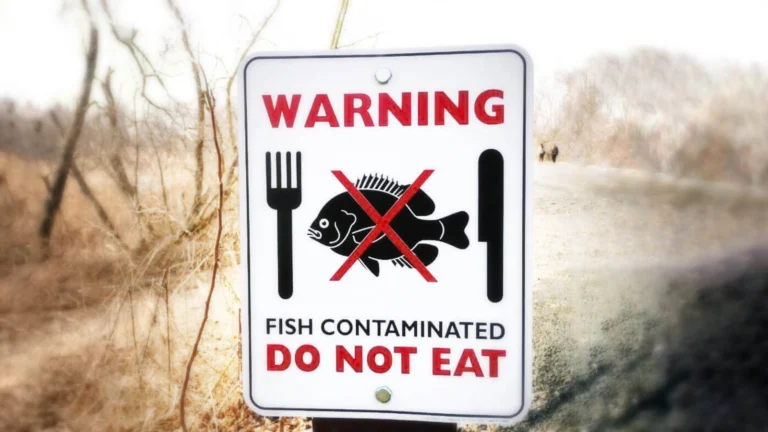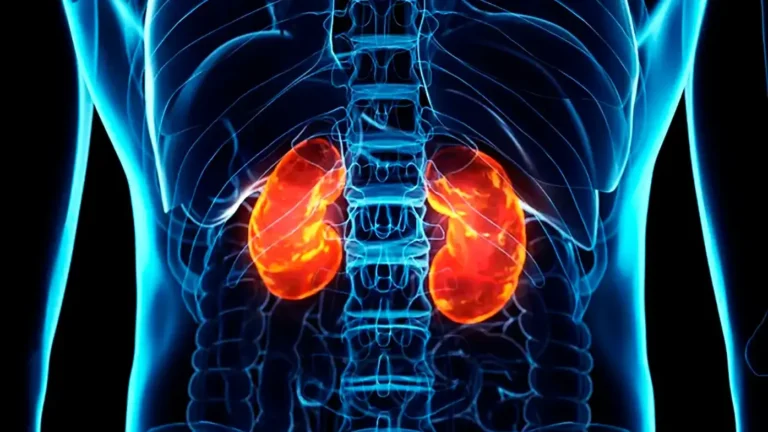Peut-on Manger des Champignons Crus : Risques pour la Santé, Nutrition et Sécurité
Les champignons contiennent des toxines sensibles à la chaleur, comme l'hydrazine ou l'agaritine, et des parois cellulaires composées de chitine qui ne peuvent pas être digérées correctement par l'homme.
Milos Pokimica
Écrit par : Milos Pokimica
Examiné Médicalement Par : Dr. Xiùying Wáng, M.D.
Mise à jour le 6 janvier 2024Principaux Enseignements :
- La chitine constitue la paroi cellulaire des champignons, qui est difficile à décomposer.
- La cuisson des champignons permet de briser leurs parois cellulaires et de libérer leurs précieux composés.
- La cuisson des champignons shiitake augmente leur antioxydant et de l'activité.
- Certaines espèces de champignons sont vénéneuses, d'autres ont des propriétés psychotropes, d'autres encore sont toxiques lorsqu'ils ne sont pas cuits et d'autres enfin sont sans danger sous quelque forme que ce soit.
- Les champignons de Paris contiennent une substance appelée agaritine, qui est un type de phénylhydrazine. Certaines études menées sur des souris ont suggéré que l'agaritine pourrait causer le cancer et que la consommation de champignons crus pourrait être mauvaise pour la santé.
- La cuisson des champignons a réduit la teneur en agaritine, mais dans des proportions différentes selon la méthode utilisée.
- Dans la cuisine normale avec des champignons de Paris, l'agaritine n'est pas présente dans les quantités nécessaires pour augmenter le taux d'agaritine. risque de cancer.
- La consommation de champignons Shiitake crus ou insuffisamment cuits peut provoquer une réaction cutanée très désagréable appelée dermatite flagellée.
- Certains champignons contiennent des substances chimiques qui peuvent provoquer des cancers chez les animaux et les humains.
- La morille contient des analogues de l'hydrazine qui sont gravement toxiques et ne doivent pas être consommés crus.
- L'hydrazine peut également provoquer des crampes d'estomac, des diarrhées et des vomissements si elle est consommée crue.
- Le deuxième champignon qui contient des analogues de l'hydrazine est le champignon de Paris, Agaricus bisporus. Ils contiennent de petites quantités allant jusqu'à 0,04% d'analogues de l'hydrazine.
- Les champignons crus peuvent être contaminés de plusieurs manières : compost ou fumier mal stérilisé, contact avec des animaux ou contamination croisée.
Les Humains Peuvent-ils Digérer les Champignons Crus ?
Peut-on manger des champignons crus ? La réponse courte est : cela dépend du champignon. Cependant, même si vous le faites, vous n'obtiendrez que des fibres et pas grand-chose du reste de la nutrition.
La chitine est une matière dure et solide qui confère aux insectes, aux crabes et à d'autres bestioles leur carapace protectrice. On trouve de la chitine dans certains aliments, comme les fruits de mer.
La chitine constitue également la paroi cellulaire des champignons, qui est donc difficile à décomposer.
Mais pouvez-vous le digérer ?
Pendant longtemps, on a pensé que la chitine était indigeste pour l'homme. Or, il s'avère que notre corps contient des enzymes spéciales appelées chitinases. Ces enzymes nous aident à combattre les parasites qui contiennent de la chitine (Paoletti et al, 2007).
Cependant, nos chitinases ne sont pas très efficaces pour digérer la chitine provenant de sources alimentaires. Elles constituent davantage un mécanisme de défense qu'une aide à la digestion. Cela signifie que manger des champignons crus ne vous apportera pas grand-chose sur le plan nutritionnel. Les champignons crus ajouteront simplement des fibres à votre alimentation, ce qui peut être bénéfique pour la santé de vos intestins.
La chitine des champignons est comparable à la cellulose des plantes. Il s'agit de deux types de fibres qui peuvent vous aider à vous sentir rassasié et à réguler votre transit intestinal.
Si vous souhaitez perdre du poids ou augmenter votre consommation de fibres, manger des champignons crus peut être un choix judicieux. Mais ne vous attendez pas à bénéficier des autres avantages que les champignons ont à offrir.
Si vous voulez révéler le potentiel nutritionnel et médicinal des champignons, vous devez les cuisiner.
La cuisson des champignons permet de briser leurs parois cellulaires et de libérer leurs précieux composés.
Ces composés comprennent des antioxydants, des vitamines, des minéraux et même certaines substances qui peuvent renforcer votre système immunitaire et lutter contre le cancer.
Résumé:
Bien que certains champignons crus puissent être consommés sans danger, leur teneur en chitine limite leurs bienfaits nutritionnels aux fibres. La cuisson des champignons permet de libérer tout leur potentiel en vitamines, minéraux, antioxydants et autres composés bénéfiques pour la santé.
Les Champignons Sont-ils MeilleursPour la Santé s'ils Sont Crus ou Cuits ?
Les champignons ne sont pas seulement délicieux, ils sont aussi bons pour la santé. Ils contiennent des antioxydants qui peuvent protéger vos cellules des dommages causés par les radicaux libres. Les champignons contiennent également des substances chimiques spécifiques qui peuvent lutter contre le cancer, augmenter notre immunité et aider à lutter contre différentes maladies.
Mais que se passe-t-il lorsque l'on fait cuire des champignons ? Perdent-ils leur antioxydants et bienfaits pour la santé?
C'est ce que les chercheurs de cette étude (Choi et al, 2006) ont voulu le savoir. Ils ont pris des champignons shiitake crus et les ont chauffés à différentes températures et à différents moments. Ils ont ensuite mesuré la quantité d'antioxydants qu'ils contenaient encore. Ils ont également testé en laboratoire leur capacité à lutter contre les radicaux libres.
Les chercheurs ont été surpris de constater que la cuisson des champignons shiitake augmentait en fait leur antioxydant et de l'activité.
Plus les champignons étaient cuits à chaud et longtemps, plus ils contenaient d'antioxydants. Par exemple, les champignons shiitake cuits à 121 °C pendant 30 minutes contenaient presque deux fois plus d'antioxydants que les champignons crus. Ils ont également mieux réussi à neutraliser les radicaux libres. Il existe un lien étroit entre la quantité d'antioxydants et la capacité à lutter contre les radicaux libres.
Il s'agit d'une conséquence de la dégradation de la chitine. L'ensemble des la teneur en antioxydants pourrait tomber et se dégrader sous l'effet de la chaleur, mais la chitine s'est également dégradée. La dégradation de la chitine à la fin du processus a augmenté la biodisponibilité des antioxydants dans les champignons et c'est ce qui est important. Ce n'est pas ce que nous mangeons mais ce que nous absorbons qui compte.
Cela signifie que vous n'avez pas à craindre de perdre les bienfaits des champignons lorsque vous les cuisinez. En fait, vous pouvez même en tirer davantage de bienfaits.
La cuisson des champignons peut les rendre plus savoureux, plus tendres et plus aromatiques, mais aussi plus nutritifs et plus protecteurs.
Résumé:
Si la cuisson peut réduire la teneur globale en antioxydants des champignons, elle décompose la chitine, ce qui augmente considérablement la biodisponibilité et les effets bénéfiques sur la santé des antioxydants restants.
Tous les Champignons Peuvent-ils Être Consommés Crus Sans Risque ?
Les champignons crus peuvent contenir des agents pathogènes dangereux et des toxines sensibles à la chaleur qui peuvent nuire à la santé.
Les champignons crus peuvent endommager les globules rouges (Shibata et al, 2010), irritent l'estomac et les intestins et déclenchent des réactions allergiques telles que des éruptions cutanées (Fang et al, 2017).
Tous les champignons ne sont pas identiques. Il varie d'une espèce à l'autre.
Certaines espèces de champignons sont vénéneuses, d'autres ont des propriétés psychotropes, d'autres encore sont toxiques lorsqu'ils ne sont pas cuits et d'autres enfin sont sans danger sous quelque forme que ce soit. Cependant, lorsque nous mangeons des champignons crus, il existe également un risque de contamination par des agents pathogènes dangereux s'ils ne sont pas manipulés correctement.
Alors, comment déguster des champignons sans risquer de nuire à sa santé ? La réponse est simple : bien les cuisiner. La cuisson des champignons ne se contente pas d'éliminer les mauvaises substances. Elle décompose également les tissus fongiques coriaces et libère des nutriments.
Mais pour bénéficier de ces avantages, il faut cuisiner les champignons correctement. D'après le Choi et al, 2006Les champignons comestibles doivent être chauffés à une température d'au moins 140 ˚F pendant 3 à 4 heures, ou mieux, à plus de 180 ˚F, ou mieux encore, à plus de 200 ˚F. Ils seront ainsi plus tendres, plus digestes et plus sûrs.
Résumé:
Les champignons crus peuvent contenir non seulement des toxines nocives, mais aussi des agents pathogènes. Une bonne cuisson tue les micro-organismes, décompose les toxines, libère les nutriments et rend les champignons sûrs et encore plus digestes.
Bouton blanc, Cremini et Portobello.
Il existe plus de 2000 sortes de champignons comestibles, mais seulement une trentaine sont cultivés ou vendus dans le commerce. Le plus courant est le champignon de Paris.
Manger des champignons de Paris crus est la même chose que manger des champignons cremini crus ou manger des champignons portobello crus. Il n'y a aucune différence. Tous ces champignons sont exactement le même champignon Agaricus bisporus. Ils sont récoltés à différents stades de croissance. Les champignons de Paris sont les plus jeunes et s'ils sont laissés à l'abandon, ils deviendront des champignons cremini bruns. Le cremini est le champignon de Paris d'âge moyen. Les portobellos, qui sont beaucoup plus gros et bruns, sont à la fin de leur développement et ont atteint leur pleine maturité.
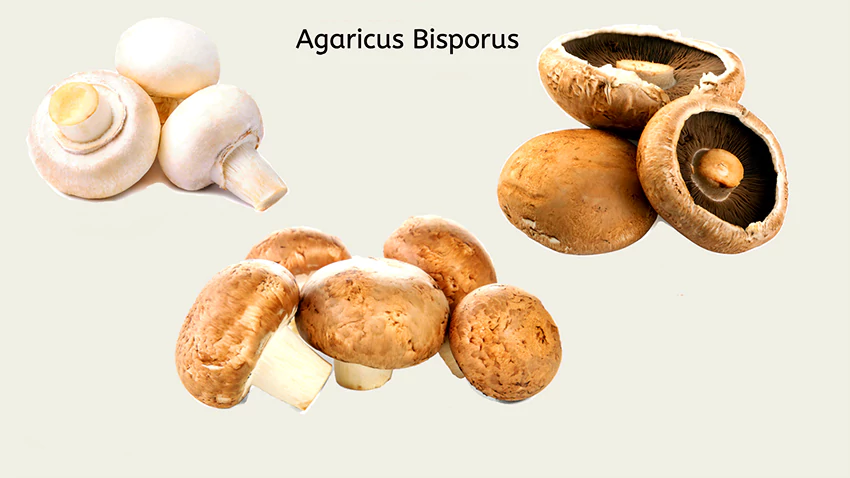
Mais il y a une chose que vous devez savoir à propos des champignons de Paris.
Les champignons de Paris contiennent une substance appelée agaritine, qui est un type de phénylhydrazine. Certaines études menées sur des souris ont suggéré que l'agaritine pourrait causer le cancer et que la consommation de champignons pourrait être mauvaise pour la santé.
Les chercheurs ont réalisé une expérience avec des souris spéciales appelées souris lacI, ou souris Big Blue (Shephard et al, 1995). Ces souris possèdent un gène qui peut changer de couleur lorsqu'il mute, ce qui permet de mesurer facilement le pouvoir mutagène de différentes substances. Les chercheurs ont nourri les souris avec trois régimes différents pendant 15 semaines : (1) des champignons frais trois fois par semaine et une alimentation normale le reste de la semaine ; (2) des champignons lyophilisés mélangés à une alimentation normale ; ou (3) un extrait de champignon à forte concentration d'agaritine mélangé à une alimentation normale.
Ils ont ensuite vérifié l'ADN de différents organes des souris pour voir si la couleur du gène lacI avait changé. Ils ont appelé cela la fréquence des mutants (MF).
Seul l'extrait de champignon avec une forte dose d'agaritine a eu un effet significatif sur la MF. Il l'a augmentée de 100 % dans les reins et de 50 % dans le préestomac. Les deux autres régimes de champignons, avec des doses plus faibles d'agaritine, n'ont pas eu d'effet significatif sur la MF, à l'exception d'une légère augmentation dans le rein. Cela signifie que l'agaritine était faiblement génotoxique in vivo, c'est-à-dire qu'elle pouvait provoquer des mutations dans les organismes vivants. Mais cela signifie aussi qu'il n'y a pas d'autre activité génotoxique dans le champignon de Paris, en dehors de l'agaritine.
Les chercheurs ont utilisé une formule pour estimer le risque de cancer lié à la présence d'agaritine dans les champignons sur la base des données de MF. Ils ont calculé que la consommation moyenne de champignons suisses de 4 g/jour entraînerait un risque de cancer cumulé sur la vie entière d'environ deux cas pour 100 000 vies. Il s'agit de champignons crus, mais les gens ne mangent généralement pas les champignons crus.
Qu'est-ce que cela signifie pour vous ? Cela signifie que vous ne devez pas trop vous inquiéter de manger des champignons de Paris crus. Ils ne sont pas très mutagènes.
Mais cela signifie aussi qu'il faut faire attention à ne pas consommer trop d'agaritine, que l'on pourrait trouver en grande quantité dans les extraits de champignons blancs ou les suppléments. L'agaritine peut provoquer des mutations dans l'ADN, en particulier dans les reins et l'estomac. Cela pourrait augmenter le risque de cancer au fil du temps.
Dans une étude humaine qui a suivi 68 327 femmes et 44 664 hommes pendant 26 ans (Lee et al, 2019), les chercheurs ont mesuré la consommation de champignons et le risque de cancer total et localisé. Ces personnes étaient toutes en bonne santé et n'avaient pas de cancer au début de l'étude. Elles ont répondu à des questions sur la fréquence de leur consommation de champignons et d'autres aliments, ainsi que sur leur mode de vie et leurs habitudes en matière de santé. Les chercheurs ont ensuite suivi le nombre de personnes qui ont développé un cancer au fil des ans.
Les personnes qui mangeaient cinq portions ou plus de champignons par semaine n'avaient pas un risque plus faible ou plus élevé de cancer total que les personnes qui ne mangeaient pratiquement pas de champignons. Il en va de même pour 16 types de cancer différents, tels que le cancer du sein, de la prostate, du côlon et de la peau. Rien n'indique que les champignons aient un effet protecteur contre ces cancers.
La plupart des gens mangent généralement des champignons de Paris ou d'autres types de champignons commerciaux et ne consomment pas de champignons fonctionnels, qui sont beaucoup plus chers et vendus sous forme de suppléments. Certains champignons fonctionnels ont prouvé anticancéreux avantages.
Cette étude montre que lors d'une cuisson normale de champignons de Paris, l'agaritine n'est pas présente en quantité suffisante pour augmenter le risque de cancer. Nous ne devons pas nous inquiéter si nous mangeons des champignons de Paris dans des pâtes ou des pizzas ou d'une autre manière qui ne prévoit pas un temps ou une température de cuisson adéquats.
Résumé:
Les champignons de Paris, bien qu'ils contiennent un composé potentiellement cancérigène appelé agaritine, ne présentent qu'un risque minime en raison de leur faible teneur et de leur faible activité mutagène. Il convient toutefois de se méfier des extraits de champignons ou des suppléments à forte dose et de veiller à bien cuire les autres variétés de champignons.
Cuisine et Agaritine.
Quelle est la quantité d'agaritine contenue dans les champignons que nous mangeons ? Et comment cette quantité varie-t-elle lorsque nous les conservons ou les cuisinons ?
Voici quelques-unes des questions auxquelles les chercheurs de cette étude ont tenté de répondre (Schulzová et al, 2002). Les chercheurs ont analysé des échantillons frais et transformés de champignons A. bitorquis et A. garicus hortensis provenant de différentes sources et ont constaté que la teneur en agaritine variait considérablement en fonction de plusieurs facteurs. Voici quelques-unes de leurs conclusions :
- Les champignons fraîchement cueillis, issus des premières poussées (les premiers lots de champignons qui poussent), présentaient des niveaux relativement élevés d'agaritine, mais les échantillons provenant des supermarchés en contenaient moins.
- La teneur en agaritine n'était pas uniformément répartie dans les champignons. Les quantités les plus élevées se trouvaient dans la peau du chapeau et dans les branchies, tandis que les plus faibles se trouvaient dans le pied.
- La conservation des champignons au réfrigérateur ou au congélateur, ou leur séchage, réduit considérablement la teneur en agaritine. Le degré de réduction dépend de la durée et des conditions de stockage et se situe généralement entre 20 % et 75 %.
- La cuisson des champignons a réduit la teneur en agaritine, mais dans des proportions différentes selon la méthode utilisée.
- L'ébullition a permis d'extraire environ 50 % de l'agaritine dans le bouillon en 5 minutes et d'en dégrader 20 à 25 % au total. Le reste de l'agaritine est resté dans le liquide, ce qui peut poser problème pour la préparation de soupes ou de sauces rapides. Une ébullition prolongée a encore réduit la teneur en agaritine (il ne restait plus qu'environ 10 % dans les champignons après 1 heure). Si vous faites bouillir des champignons, jetez l'eau.
- La cuisson au four, comme pour la préparation d'une pizza, a réduit la teneur en agaritine d'environ 23%.
- La cuisson à l'huile ou au beurre ou la friture l'ont réduite de 50%.
- Le passage des champignons au micro-ondes a permis de réduire la teneur en agaritine à un tiers de sa valeur initiale.
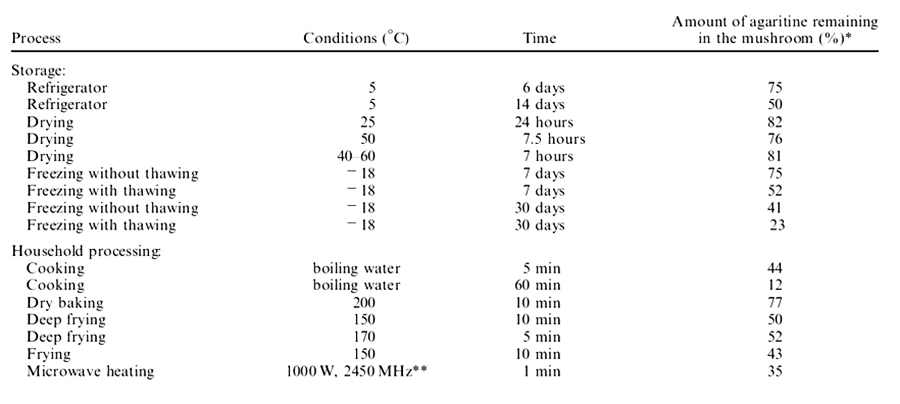
Champignons Shiitake.
Les shiitakes sont un type de champignons cultivés dans le bois, très appréciés dans les cuisines japonaise et chinoise. Ils sont les deuxièmes champignons comestibles les plus consommés au monde, avec une production annuelle estimée à plus de 10 000 tonnes.
Mais elles ne sont pas seulement savoureuses et nutritives. Ils ont également des effets bénéfiques étonnants sur la santé, comme la réduction de la tension artérielle, du cholestérol et du risque de cancer. C'est pourquoi les champignons shiitake occupent une place importante dans la médecine traditionnelle asiatique.
Mais avant de vous précipiter au supermarché ou à l'épicerie asiatique la plus proche pour acheter des champignons Shiitake, il y a une chose que vous devez savoir.
La consommation de champignons Shiitake crus ou insuffisamment cuits peut provoquer une réaction cutanée très désagréable appelée dermatite flagellée.

Il s'agit d'une affection rare, à laquelle 2% des personnes sont sensibles, qui provoque des démangeaisons, des rougeurs et des cloques sur la peau, ressemblant à des marques de coups de fouet. Elles apparaissent généralement 24 à 48 heures après la consommation de champignons et peuvent durer des jours ou des semaines. Les zones les plus fréquemment touchées sont le tronc, les bras, les jambes et le cou, mais parfois le visage ou le cuir chevelu peuvent également être atteints.
Vous vous demandez peut-être pourquoi cela se produit. Le coupable est une substance appelée lentinane, un type de polysaccharide que l'on trouve dans les champignons Shiitake. Le lentinan possède des propriétés anti-inflammatoires et antitumorales, raison pour laquelle il est utilisé comme thérapie adjuvante pour les patients atteints de cancer au Japon. Cependant, le lentinan stimule également la production d'une substance chimique appelée IL-1, qui provoque une inflammation et une dilatation des vaisseaux sanguins. Cela pourrait expliquer pourquoi certaines personnes développent une dermatite flagellée après avoir mangé des champignons Shiitake.
Le traitement de la dermatite à flagelles est principalement symptomatique. Cela signifie que vous pouvez utiliser des crèmes ou des pommades topiques pour soulager les démangeaisons et l'inflammation, comme des corticostéroïdes ou des antihistaminiques. Vous pouvez également prendre des antihistaminiques ou des analgésiques par voie orale si nécessaire.
Toutefois, la meilleure façon de prévenir la dermatite flagellée est d'éviter de manger des champignons Shiitake crus ou insuffisamment cuits. Même si vous les faites bien cuire, vous risquez toujours de développer la maladie si vous êtes sensible au lentinane. Il est donc conseillé de ne pas consommer de champignons shiitake si vous avez déjà souffert de dermatite flagellée ou si vous avez des antécédents d'allergies ou d'asthme.
Résumé:
Bien que délicieux et bénéfiques pour la santé, les champignons Shiitake crus ou insuffisamment cuits peuvent déclencher une éruption cutanée rare, semblable à un coup de fouet, chez les personnes prédisposées. Optez pour une cuisson complète ou évitez complètement les shiitakes si vous êtes sujet à des allergies ou à une dermatite flagellée.
Fausse Morille.
Certains champignons contiennent des substances chimiques qui peuvent provoquer des cancers chez les animaux et les humains.
La première est la fausse morille, également connue sous le nom de Gyromitra esculenta. Il s'agit d'un champignon sauvage qui ressemble à un cerveau ou à une éponge. Il pousse dans les régions tempérées d'Europe, d'Asie et d'Amérique du Nord. Certaines personnes le consomment comme un mets délicat, mais elles doivent le cuire très soigneusement pour en éliminer les toxines.
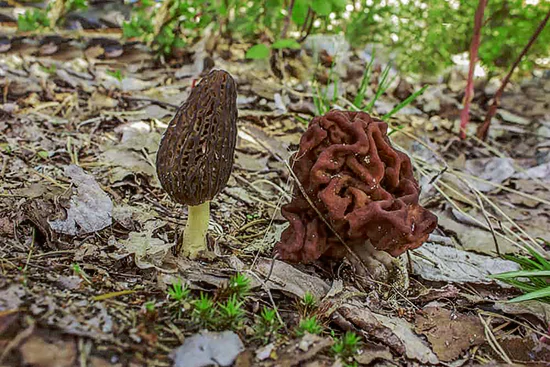
Quelles sont ces toxines ? Elles sont appelées analogues de l'hydrazine, ce qui signifie qu'elles ont une structure similaire à celle de l'hydrazine, un produit chimique hautement réactif et explosif utilisé dans le carburant des fusées. Ces analogues de l'hydrazine peuvent endommager le foie et provoquer des cancers.
Des scientifiques ont effectué des expériences avec de l'hydrazine sur des souris et des hamsters. La plupart des animaux ont développé des tumeurs dans leur foie et d'autres organes (Spencer & Kisby, 2021).
L'hydrazine peut également provoquer des crampes d'estomac, des diarrhées et des vomissements si elle est consommée crue.
Cette toxine est détruite par la cuisson, c'est pourquoi il faut toujours cuire les morilles avant de les manger. La cuisson améliore également leur saveur et leur texture, qui sont à la fois noisette, terre et viande.
Si vous souhaitez manger des morilles, vous devez également vous assurer qu'elles sont propres et fraîches. Vous pouvez les rincer à l'eau froide et les faire tremper dans de l'eau salée pendant une nuit pour éliminer toute trace de saleté ou d'insectes. Vous devez également éviter de boire de l'alcool lorsque vous mangez des morilles, car cela peut augmenter les effets toxiques de l'hydrazine.
Le deuxième champignon qui contient des analogues de l'hydrazine est le champignon de Paris, Agaricus bisporus. Ils contiennent de petites quantités d'analogues de l'hydrazine pouvant aller jusqu'à 0,04 %.
Il convient d'être prudent lors de la consommation de champignons contenant des analogues de l'hydrazine. Il faut absolument éviter de manger des fausses morilles crues ou mal cuites. Les champignons de Paris doivent également être bien cuits avant d'être consommés.
Résumé:
Les analogues de l'hydrazine présents dans certains champignons, notamment les fausses morilles, présentent des risques de cancer. Sachez que même les champignons de Paris contiennent de petites quantités d'hydrazine. Une bonne cuisson détruit ces toxines. Faites donc bien cuire vos champignons, en particulier les variétés sauvages comme les morilles.
Quels Sont les Champignons que l'on Peut Manger Crus ?
Tous les champignons ne sont pas égaux. Certains sont toxiques, d'autres sont médicinaux et d'autres encore sont tout simplement délicieux. Comment savoir lesquels vous pouvez manger crus et lesquels vous devez cuisiner ? Laissez-moi vous donner quelques conseils.
Tout d'abord, ne mangez jamais un champignon dont vous ne connaissez pas la nature. Vous pouvez penser que vous choisissez une friandise savoureuse, mais vous risquez d'avoir une mauvaise surprise. Certains champignons sont tellement toxiques qu'ils peuvent vous tuer ou vous rendre très malade même après les avoir cuisinés. Par exemple, le champignon "death cap" ressemble à un champignon blanc innocent, mais il contient une toxine mortelle qui peut détruire votre foie. Soyez donc toujours prudent et faites des recherches avant de manger des champignons sauvages.
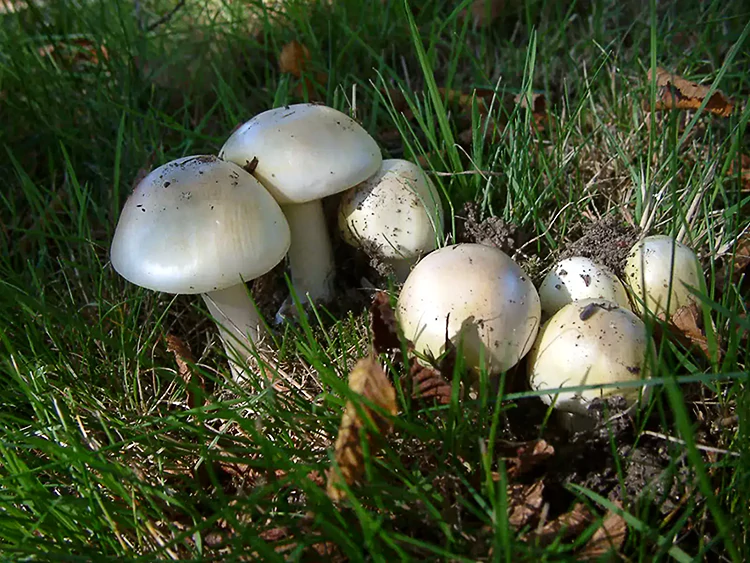
Deuxièmement, certains champignons sont comestibles mais peu appétissants lorsqu'ils sont crus. Ils sont soit trop durs, soit trop amers, soit trop fades pour être appréciés sans cuisson.
Par exemple, les champignons reishi sont un type de champignon médicinal qui présente de nombreux avantages pour la santé, tels que le renforcement du système immunitaire et la lutte contre l'inflammation. Mais ils sont également très durs et ligneux, et il n'est donc pas possible de les croquer. Ils doivent être séchés et réduits en poudre ou extraits sous forme de thé ou de teinture.
Un autre exemple est celui des champignons de miel, qui sont également connus sous le nom d'armillaires ou de champignons en forme de lacet. Il s'agit d'un champignon comestible commun qui pousse en grappes de bois. Mais ils ne peuvent pas être consommés crus car ils peuvent provoquer des crampes d'estomac, des nausées et des vomissements. Il faut donc bien les cuire pour se débarrasser des toxines et les rendre plus digestes.
Parmi les autres champignons comestibles qu'il est préférable de cuire plutôt que de les manger crus, citons les cèpes, tels que le porcini ou le penny bun. Ce sont des champignons très appréciés des gourmets, qui ont une saveur riche et noisetée. Mais ils sont également très denses et croquants lorsqu'ils sont crus. Il faut donc les cuire pour les ramollir et faire ressortir leur arôme.
Certains champignons peuvent être consommés crus en toute sécurité et avec goût, mais seulement si vous les préparez correctement. Vous devez les laver soigneusement et vérifier qu'ils ne contiennent pas de saletés, d'insectes ou de moisissures avant de les manger crus.
Les champignons crus peuvent être contaminés de plusieurs manières : compost ou fumier mal stérilisé, contact avec des animaux ou contamination croisée.
Il y a naturellement un plus grand risque de intoxication alimentaire ou problèmes digestifs en cas de consommation de champignons crus. Vous devez également les conserver dans un endroit frais et sec pour éviter qu'ils ne se détériorent.
Résumé:
Si certains champignons comestibles peuvent être consommés crus, il est essentiel de les laver soigneusement et de les conserver correctement pour éviter toute contamination. En outre, l'identification des champignons sauvages est cruciale pour la sécurité, car certains sont mortels même lorsqu'ils sont cuits. Il faut toujours privilégier la prudence et l'identification correcte avant de consommer un champignon sauvage, qu'il soit cuit ou cru.
Quelques exemples de champignons :
- Champignons Enoki : Ce sont des champignons fins et blancs qui ont de longs pieds et de petits chapeaux. Ils ont un goût doux et croquant qui se marie bien avec les salades et les soupes. Ces champignons peuvent généralement être consommés crus, car ils sont cultivés dans des conditions stériles. Au début de l'année 2023, un avis aux consommateurs a été émis concernant des champignons enoki potentiellement contaminés par la listeria en provenance de Chine. Les aliments contaminés par la listeria peuvent mettre en danger la vie des femmes enceintes, des nouveau-nés, des personnes âgées et des personnes dont le système immunitaire est affaibli.
- Pleurotes : Ce sont des champignons en forme d'éventail qui ont une texture douce et veloutée. Ils ont une saveur subtile et sucrée qui s'accorde avec de nombreux plats, mais ils ont tendance à avoir une saveur légèrement métallique lorsqu'ils ne sont pas cuits. Ces champignons sont également cultivés dans des environnements propres et peuvent être consommés crus.
- Les cèpes : Ils sont également connus sous le nom de cèpes ou de bolets. Il s'agit de champignons sauvages dotés d'un grand chapeau brun et d'un pied épais. Ces champignons ne peuvent pas être consommés crus, car ils peuvent contenir des bactéries, des parasites ou des toxines nocives. Ils doivent être cuits pendant au moins 10 minutes pour tuer tout pathogène potentiel et rehausser leur saveur.
- Champignons Shimeji : Ils sont également connus sous le nom de champignons de hêtre ou de champignons de Paris. Ce sont de petits champignons bruns ou blancs qui poussent en grappes sur le bois. Ces champignons ne peuvent pas être consommés crus, car ils peuvent provoquer des maux d'estomac ou des réactions allergiques.
Enfin, certains champignons sont techniquement comestibles lorsqu'ils sont crus, mais ils ne sont pas très agréables. Ils peuvent avoir une texture ou un goût désagréable qui les rend peu attrayants sans cuisson. Par exemple, les pleurotes sont des champignons larges et épais qui ont une saveur douce et légèrement sucrée. Mais ils sont également très denses et caoutchouteux lorsqu'ils sont crus, et ne sont donc pas très agréables à manger. Il faut les cuire pour les rendre plus tendres et plus savoureux.
N'oubliez pas de toujours identifier vos champignons avant de les manger, de cuire ceux qui doivent l'être, de laver ceux qui peuvent être consommés crus et d'éviter ceux qui sont toxiques ou peu appétissants. Les champignons sont un aliment merveilleux qui peut vous offrir de nombreux avantages si vous les consommez correctement.
FAQ
Références :
- Paoletti, M. G., Norberto, L., Damini, R. et Musumeci, S. (2007). Human gastric juice contains chitinase that can degrade chitin (Le suc gastrique humain contient de la chitinase qui peut dégrader la chitine). Annals of nutrition & metabolism, 51(3), 244-251. https://doi.org/10.1159/000104144
- Choi, Y., Lee, S., Chun, J., Lee, H. et Lee, J. (2006). Influence du traitement thermique sur les activités antioxydantes et les composés polyphénoliques du champignon Shiitake (Lentinus edodes). Food Chemistry, 99(2), 381-387. https://doi.org/10.1016/j.foodchem.2005.08.004
- Shibata, T., Kudou, M., Hoshi, Y., Kudo, A., Nanashima, N. et Miyairi, K. (2010). Isolation et caractérisation d'une nouvelle hémolysine à deux composants, l'érylysine A et B, à partir d'un champignon comestible, Pleurotus eryngii. Toxicon, 56(8), 1436-1442. https://doi.org/10.1016/j.toxicon.2010.08.010
- Fang, S., Bajoghli, A. et Bajoghli, M. (2017). Dermatite flagellée induite par le champignon shiitake. Annales de l'allergie, de l'asthme et de l'immunologie : publication officielle de l'American College of Allergy, Asthma, & Immunology, 119(5), 462-463. https://doi.org/10.1016/j.anai.2017.08.007
- Shephard, S. E., Gunz, D. et Schlatter, C. (1995). Genotoxicity of agaritine in the lacI transgenic mouse mutation assay : evaluation of the health risk of mushroom consumption. Food and chemical toxicology : an international journal published for the British Industrial Biological Research Association, 33(4), 257-264. https://doi.org/10.1016/0278-6915(94)00142-b
- Lee, D. H., Yang, M., Keum, N., Giovannucci, E. L., Sun, Q. et Chavarro, J. E. (2019). Consommation de champignons et risque de cancer total et localisé dans deux grandes cohortes prospectives américaines. Cancer prevention research (Philadelphie, Pa.), 12(8), 517-526. https://doi.org/10.1158/1940-6207.CAPR-19-0101
- Moyano, E. G. et Pilar, L. M. (2021). Dermatite flagellée secondaire à la consommation de champignons shiitake. Soins primaires, 53(1), 102-103. https://doi.org/10.1016/j.aprim.2019.09.008
- Spencer, P. S. et Kisby, G. E. (2021). Role of Hydrazine-Related Chemicals in Cancer and Neurodegenerative Disease (Rôle des produits chimiques liés à l'hydrazine dans le cancer et les maladies neurodégénératives). Chemical research in toxicology, 34(9), 1953-1969. https://doi.org/10.1021/acs.chemrestox.1c00150
Vous avez des questions sur la nutrition et la santé ?
J'aimerais avoir de vos nouvelles et y répondre dans mon prochain post. J'apprécie votre contribution et votre opinion et j'ai hâte d'avoir de vos nouvelles bientôt. Je vous invite également à nous suivre sur Facebook, Instagram et Pinterest pour plus de contenu sur l'alimentation, la nutrition et la santé. Vous pouvez y laisser un commentaire et entrer en contact avec d'autres passionnés de santé, partager vos conseils et expériences, et obtenir le soutien et les encouragements de notre équipe et de notre communauté.
J'espère que ce billet a été instructif et agréable pour vous et que vous êtes prêt à mettre en pratique les connaissances que vous avez acquises. Si vous avez trouvé ce billet utile, veuillez le partager à vos amis et à votre famille qui pourraient également en bénéficier. On ne sait jamais qui peut avoir besoin de conseils et de soutien dans son parcours de santé.
– Vous pourriez aussi aimer –

Apprendre la Nutrition
Milos Pokimica est docteur en médecine naturelle, nutritionniste clinique, rédacteur en santé médicale et nutrition et conseiller en sciences nutritionnelles. Auteur de la série de livres Devenir vegetarien ? Examen des sciences, il exploite également le site Web de santé naturelle GoVeganWay.com
Avis de non-responsabilité médicale
GoVeganWay.com vous propose des critiques des dernières recherches liées à la nutrition et à la santé. Les informations fournies représentent l'opinion personnelle de l'auteur et ne sont pas destinées ni implicitement à remplacer un avis médical professionnel, un diagnostic ou un traitement. Les informations fournies sont fournies à titre informatif uniquement et ne sont pas destinées à remplacer la consultation, le diagnostic et/ou le traitement médical d'un médecin ou d'un prestataire de soins de santé qualifié.NE JAMAIS IGNORER LES CONSEILS MÉDICAUX PROFESSIONNELS OU RETARDER LA RECHERCHE DE SOINS MÉDICAUX EN RAISON DE QUELQUE CHOSE QUE VOUS AVEZ LU OU ACCÉDÉ SUR GoVeganWay.com
N'APPLIQUEZ JAMAIS DE CHANGEMENTS AU STYLE DE VIE OU TOUT CHANGEMENT À LA SUITE DE QUELQUE CHOSE QUE VOUS AVEZ LU SUR GoVeganWay.com AVANT DE CONSULTER UN PRATICIEN MÉDICAL AGRÉÉ.
En cas d'urgence médicale, appelez immédiatement un médecin ou le 911. GoVeganWay.com ne recommande ni n'approuve aucun groupe, organisation, test, médecin, produit, procédure, opinion ou autre information spécifique pouvant être mentionné à l'intérieur.
Choix de l'éditeur -
Milos Pokimica est rédacteur spécialisé dans la santé et la nutrition et conseiller en sciences nutritionnelles. Auteur d'une série de livres Devenir vegetarien ? Examen des sciences, il exploite également le site Web de santé naturelle GoVeganWay.com
Derniers articles –
Top Des Nouvelles Sur la Santé - ScienceDaily
- The overlooked nutrition risk of Ozempic and Wegovyle février 4, 2026
Popular weight-loss drugs like Ozempic and Wegovy can dramatically curb appetite, but experts warn many users are flying blind when it comes to nutrition. New research suggests people taking these medications may not be getting enough guidance on protein, vitamins, and overall diet quality, increasing the risk of muscle loss and nutrient deficiencies.
- A 25-year study found an unexpected link between cheese and dementiale février 4, 2026
A massive Swedish study tracking nearly 28,000 people for 25 years found an unexpected link between full-fat dairy and brain health. Among adults without a genetic risk for Alzheimer’s, eating more full-fat cheese was associated with a noticeably lower risk of developing the disease, while higher cream intake was tied to reduced dementia risk overall. The findings challenge decades of low-fat dietary advice but come with important caveats.
- MIT’s new brain tool could finally explain consciousnessle février 4, 2026
Scientists still don’t know how the brain turns physical activity into thoughts, feelings, and awareness—but a powerful new tool may help crack the mystery. Researchers at MIT are exploring transcranial focused ultrasound, a noninvasive technology that can precisely stimulate deep regions of the brain that were previously off-limits. In a new “roadmap” paper, they explain how this method could finally let scientists test cause-and-effect in consciousness research, not just observe […]
- Why heart disease risk in type 2 diabetes looks different for men and womenle février 4, 2026
Scientists are digging into why heart disease risk in type 2 diabetes differs between men and women—and sex hormones may be part of the story. In a large Johns Hopkins study, men with higher testosterone had lower heart disease risk, while rising estradiol levels were linked to higher risk. These hormone effects were not seen in women. The results point toward more personalized approaches to heart disease prevention in diabetes.
- Sound machines might be making your sleep worsele février 4, 2026
Sound machines may not be the sleep saviors many believe. Researchers found that pink noise significantly reduced REM sleep, while simple earplugs did a better job protecting deep, restorative sleep from traffic noise. When pink noise was combined with outside noise, sleep quality dropped even further. The results suggest that popular “sleep sounds” could be doing more harm than good—particularly for kids.
- This unexpected plant discovery could change how drugs are madele février 3, 2026
Plants make chemical weapons to protect themselves, and many of these compounds have become vital to human medicine. Researchers found that one powerful plant chemical is produced using a gene that looks surprisingly bacterial. This suggests plants reuse microbial tools to invent new chemistry. The insight could help scientists discover new drugs and produce them more sustainably.
- A hidden cellular process may drive aging and diseasele février 3, 2026
As we age, our cells don’t just wear down—they reorganize. Researchers found that cells actively remodel a key structure called the endoplasmic reticulum, reducing protein-producing regions while preserving fat-related ones. This process, driven by ER-phagy, is tied to lifespan and healthy aging. Because these changes happen early, they could help trigger later disease—or offer a chance to stop it.
PubMed, #régime-vegan –
- Diet type and the oral microbiomele février 2, 2026
CONCLUSION: The diet-oral microbiome-systemic inflammation axis is bidirectional and clinically relevant. Understanding both direct ecological regulation and indirect metabolic effects is essential to support precision nutrition strategies aimed at maintaining oral microbial balance and systemic inflammatory risk mitigation.
- Consensus document on healthy lifestylesle janvier 22, 2026
Proteins are a group of macronutrients that are vital to our lives, as they perform various functions, including structural, defensive and catalytic. An intake of 1.0-1.2 g/kg/body weight per day would be sufficient to meet our needs. Carbohydrate requirements constitute 50 % of the total caloric value and should be obtained mainly in the form of complex carbohydrates. In addition, a daily intake of both soluble and insoluble fiber is necessary. Regular consumption of extra virgin olive oil […]
- Vitamin B12 and D status in long-term vegetarians: Impact of diet duration and subtypes in Beijing, Chinale janvier 21, 2026
CONCLUSIONS: This study reveals a dual challenge among Beijing long-term vegetarians: vitamin B12 deficiency was strongly associated with the degree of exclusion of animal products from the diet (veganism), while vitamin D deficiency was highly prevalent and worsened with longer diet duration. The near-universal vitamin D deficiency observed in this study suggests that, in the Beijing context, the risk may extend beyond dietary choice, potentially reflecting regional environmental factors;…
- Nutritional evaluation of duty meals provided to riot police forces in Germanyle janvier 13, 2026
Background: The primary role of the German riot police is maintaining internal security. Due to challenging working conditions, riot police forces face an elevated risk of various diseases. During duty, forces are provided with meals. A balanced diet can reduce the risk of some of these diseases and contribute to health-promoting working conditions. Aim: First evaluation of the nutritional quality of duty meals in Germany based on German Nutrition Society recommendations (DGE). Methods: In…
- Iodinele janvier 1, 2006
Iodine is an essential trace nutrient for all infants that is a normal component of breastmilk. Infant requirements are estimated to be 15 mcg/kg daily in full-term infants and 30 mcg/kg daily in preterm infants.[1] Breastmilk iodine concentration correlates well with maternal urinary iodine concentration and may be a useful index of iodine sufficiency in infants under 2 years of age, but there is no clear agreement on a value that indicates iodine sufficiency, and may not correlate with […]
Messages aléatoires –
Postes en vedette -
Dernières Nouvelles de PubMed, #alimentation végétale –
- From paddy soil to dining table: biological biofortification of rice with zincpar Lei Huang le février 4, 2026
One-third of paddy soils are globally deficient in zinc (Zn) and 40% of Zn loss in the procession from brown rice to polished rice, which results in the global issue of hidden hunger, e.g., the micronutrient deficiencies in the rice-based population of developing countries. In the recent decades, biofortification of cereal food crops with Zn has emerged as a promising solution. Herein, we comprehensively reviewed the entire process of Zn in paddy soil to human diet, including the regulatory…
- Molecular Characterization of Tobacco Necrosis Virus A Variants Identified in Sugarbeet Rootspar Alyssa Flobinus le février 3, 2026
Sugarbeet provides an important source of sucrose; a stable, environmentally safe, and low-cost staple in the human diet. Viral diseases arising in sugarbeet ultimately impact sugar content, which translates to financial losses for growers. To manage diseases and prevent such losses from occurring, it is essential to characterize viruses responsible for disease. Recently, our laboratory identified a tobacco necrosis virus A variant named Beta vulgaris alphanecrovirus 1 (BvANV-1) in sugarbeet…
- Nutrition in early life interacts with genetic risk to influence preadult behaviour in the Raine Studypar Lars Meinertz Byg le février 3, 2026
CONCLUSIONS: Nutrition in early life and psychiatric genetic risk may interact to determine lasting child behaviour. Contrary to our hypothesis, we find dietary benefits in individuals with lower ADHD PGS, necessitating replication. We also highlight the possibility of including genetics in early nutrition intervention trials for causal inference.
- Effect of the gut microbiota on insect reproduction: mechanisms and biotechnological prospectspar Dilawar Abbas le février 2, 2026
The insect gut microbiota functions as a multifunctional symbiotic system that plays a central role in host reproduction. Through the production of bioactive metabolites, gut microbes interact with host hormonal pathways, immune signaling, and molecular regulatory networks, thereby shaping reproductive physiology and fitness. This review summarizes recent advances in understanding how gut microbiota regulate insect reproduction. Accumulating evidence demonstrates that microbial metabolites…
- Rationale and design of a parallel randomised trial of a plant-based intensive lifestyle intervention for diabetes remission: The REmission of diabetes using a PlAnt-based weight loss InteRvention…par Brighid McKay le février 2, 2026
CONCLUSIONS: This trial will provide high-quality clinical evidence on the use of plant-based ILIs to address the epidemics of obesity and diabetes to inform public health policies and programs in Canada and beyond.
- Diet type and the oral microbiomepar Daniel Betancur le février 2, 2026
CONCLUSION: The diet-oral microbiome-systemic inflammation axis is bidirectional and clinically relevant. Understanding both direct ecological regulation and indirect metabolic effects is essential to support precision nutrition strategies aimed at maintaining oral microbial balance and systemic inflammatory risk mitigation.








